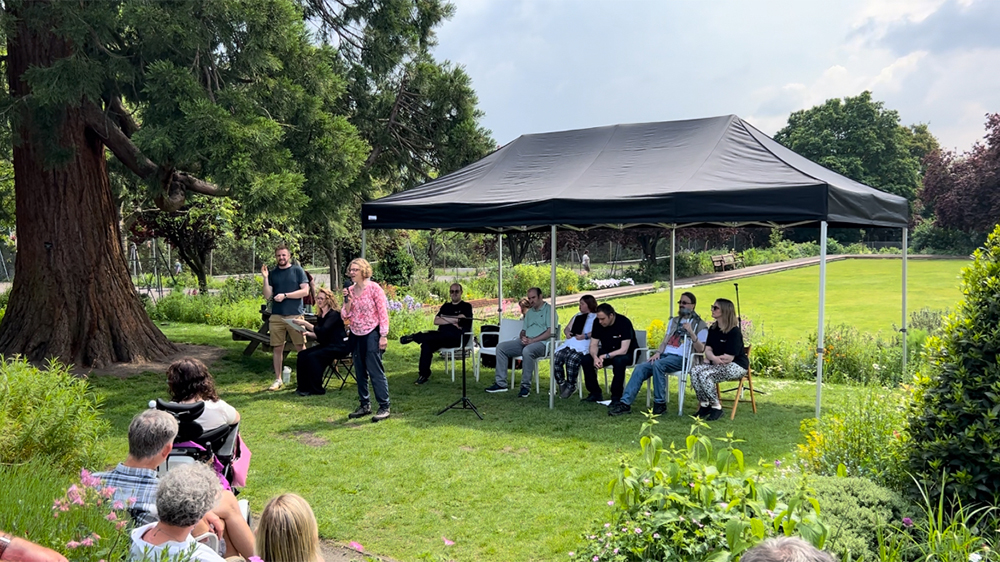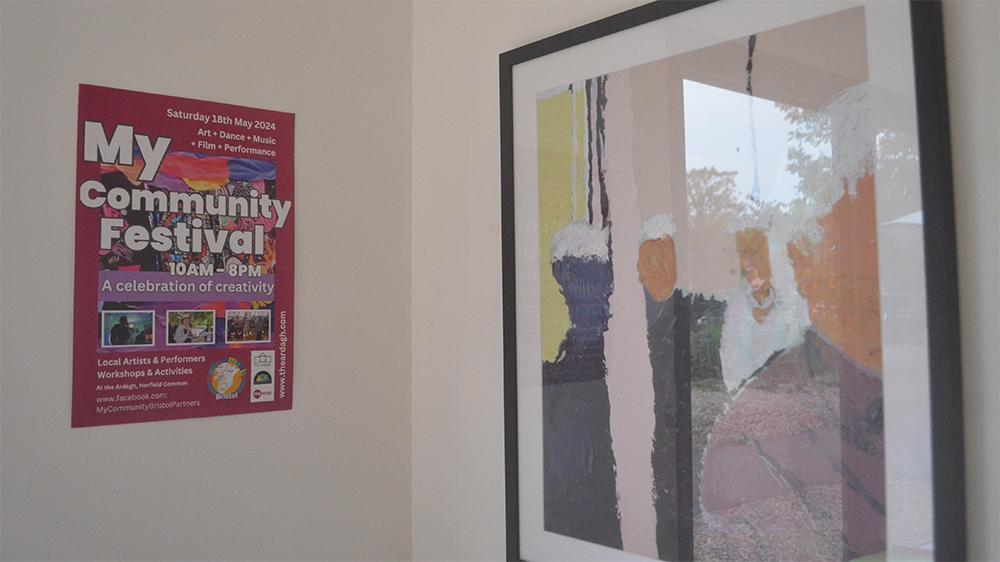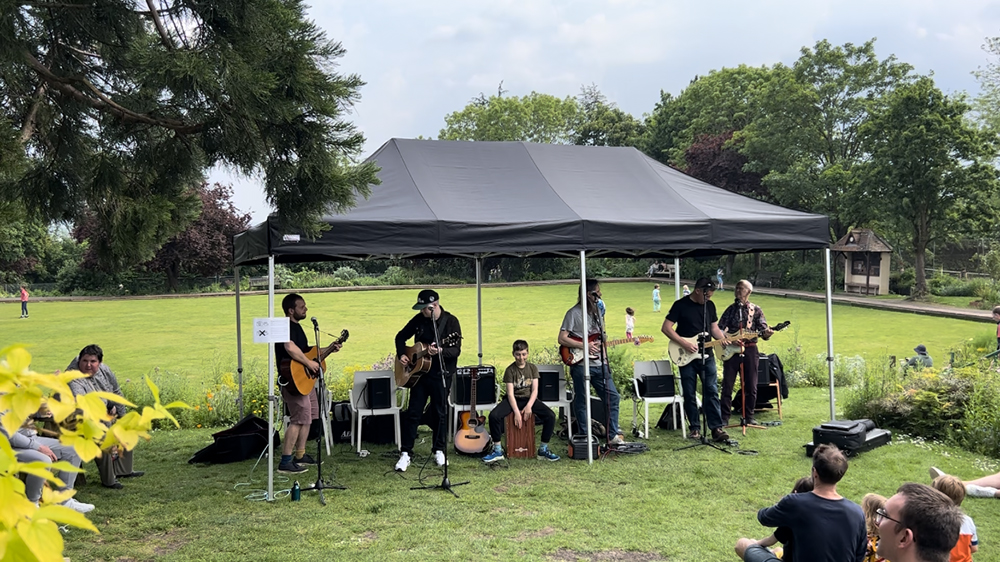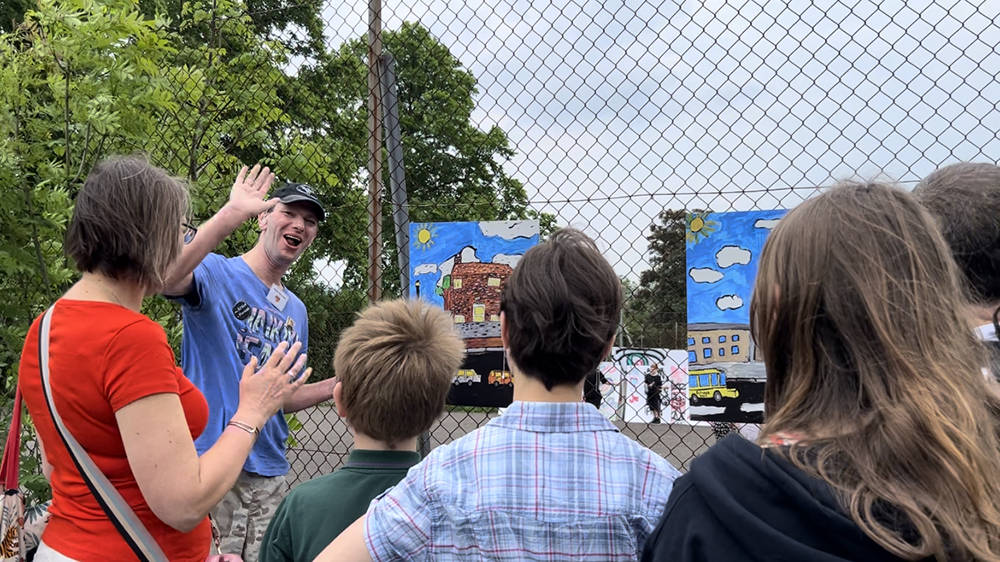Bristol community project held a festival for artists with learning disability; how do local orgs include and support them?

“I can try to do it myself, but I might need your help—it’s just a disability, that’s my reality,” This is a line from a poem written by Beth Richards, an artist with learning disability in Bristol.
Beth is more than just a poet; she’s also an actress, painter, animator, and activist. She credits the arts with giving her “the confidence to speak up for myself.”
“I like doing arts, I like doing something different and to see if I can do it. It’s fun.” says Beth. “Although before I might question myself, why am I doing? Is it right? Should I leave it? Once it is made, I’m please with it.”
For Beth, art is more than a form of self-expression, it is also a way to speak out the experiences of living with learning disabilities. With this spirit, she chose to share her poetry on the stage of My Community Festival last Saturday.

There are nine My Community projects spread across England, Wales, and Northern Ireland. Each project engages local residents as ‘Community Partners’ to address the issues that matter to this community.
Initially, there were two organisations in Bristol that helped people with learning disabilities, SENDaWelcome and Step and Stone. They were started by parents who have children with learning disabilities, and work towards full inclusion of people with learning disability into every part of the community.
Recognising the need for support, they approached Mencap and successfully secured funding for Bristol through Mencap’s Covid-19 Support Programme to create My Community Bristol. That is how My Community Bristol got started.
“In My community Bristol, we have an action group of local people with and without learning disabilities,” says Alice Cranston, the community partners of My community Bristol. “And one of the things the action group told us was that they really wanted some events where people can find out Information on what’s happening in their local area, find new places that will show the talents and skills of disabled people living in the community. So we are running this event.”
My community festival is more like an inclusive celebration of the creative talents and skills of artists, writers, filmmakers and performers with disabilities in the community. The event features performances and exhibitions by various local arts groups and charities in Bristol that support people with learning disabilities.
Milestones Trust, for example, showcases three of their engaging projects at the event, including music train, painting exhibitions and warmly wheelers.

“Our project expressions has been around for about 15 years now. We hold sessions at the trust, and also getting out into the community more.” says Dina Stanley, the manager of Milestones Trust. “We are working for people with learning disabilities and mental health needs. Take the music train for example, it is a live band that was set up by a lady to give her son, who has severe autism, the right live musical environment. It is popular and now comes to the community, open for everybody, including people with dementia, mental health problems.”
“In our projects, they are getting an opportunity to explore all aspects of art. They love doing it, and they are actually really creative. Most importantly, they build up confidence and well being in the process, and have financial support.”says Dina.
In addition to Milestones Trust, several other organizations are playing pivotal roles in the My Community Festival, and contributing their unique strengths and perspectives to the celebration of arts and inclusion.
Bigger House Film premiered an animation, the DarkFox and showed several Different Voices films from their project. All of them are produced by people with learning disability. And some of the film makers and actors came to share their idea.
Tom Stubbs and Stephen Clarke are the two partners in Bigger House Film and have been working together for over 20 years. They hope that through film to make people who might describe themselves as being removed from the centre, find their voice and and create extraordinary stories.
“We are currently working on a project called we need to talk about death,” says Tom Stubbs. “The intention of the film is to remove the taboo from talking about death and dying and open up conversations.”
Through the working with people with learning disabilities and autism, Tom Stubbs and the team are noticed that those people are often protected from talking to others about death and dying. This overprotection is often well-intentioned but means that it is difficult for people to talk about what is most important to them in terms of death, dying and bereavement. So they want to work with a group of people with learning disabilities to identify what is most important to them and encourage others to start the conversation.
“Now you can watch online, it is a 15 minutes long and are divided into various sections.” says Tom. “We hope that through this film, people will learn more about this group.”
Art in Motion was also in the spotlight, showcasing a collection of expressive paintings made by learning disabled artists.

Misfits Theatre also brought in poetry performances. As a theatre led by and for people with learning disabilities, Misfits offering a variety of different activities, such as drama, poetry and dance.
Beth is involved in a number of organisations there. At Misfits, she is doing poetry and plays about people with learning disability.
As an actress, Beth has done a research about people with learning disabilities on TV years ago. In this report of her research, Beth says that the majority of people in our study said they would like to see more people with learning disabilities on TV, in different roles. Programmes should tell us about people’s real lives, not just their disabilities. And some people think that people with learning disabilities can’t do things, and seeing more people with learning disabilities on TV might change that prejudice.
On the stage of plays and musicals, it has also been pointed out that roles with disabilities should be played by people with real disabilities, as this would be really help to the disabled and the diversity.
“I hope in the future, people with learning disabilities will be seen in programmes and on stage as much as other actors and artists.” says Beth.
